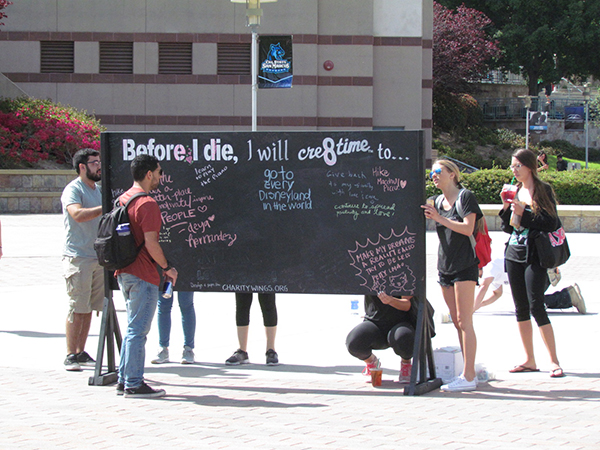Program Helps College Students Tackle Advance Care Planning
Nobody likes to think about dying – and talking about it can be even harder. The best way to approach the subject, many experts agree, is to start a conversation about living, and what it means to live well until the very end.
That’s the focus of “What Gives Your Life Meaning? (And Who Needs to Know),” a series of events planned this month at Cal State San Marcos highlighting the importance of advance care planning, a process designed to make sure people can make clear the treatments they want – or don’t want – if they are one day unable to communicate for themselves.
Sharon Hamill, PhD, a CSUSM professor of psychology and the faculty director for the CSU Shiley Institute for Palliative Care at Cal State San Marcos, said the idea for the annual campaign emerged four years ago when a faculty learning community began talking about how to engage students around the concept of advance care planning.
“We recognized fairly quickly that you’re not going to walk up to a 19-year-old and start talking about death,” Hamill said, “Instead, we wanted to frame the conversation in a more positive way, talking about life and what gives your life meaning. That’s what should inform those important medical decisions.”
The need to grow awareness about advance care planning is clear. Research shows roughly 74 percent of American adults – and 89.2% of college students – haven’t documented their healthcare choices by completing an advance directive, or communicating their healthcare wishes to family or friends.

Starting the Conversation
Hamill said that since the very first WGYLM campaign launched in 2015, she’s discovered students are ready and willing to confront such weighty topics. “When we first started, some people thought we were crazy to try to have these conversations with college students,” Hamill said. “But we found that students are engaged and want to talk about it – not just for themselves, but for their parents and grandparents. The opportunity to have honest conversations is priceless to them.”
This year’s campaign kicked off April 3 with a staff and faculty workshop, facilitated by Hamill and Debbie Ipsen, a retired RN and community volunteer with the Institute. The pair led attendees through a discussion on why advance care planning is important, what resources are available, and how to begin such vital conversations with loved ones. A similar workshop for students will be held April 12.
The format is non-threatening and suggests raising the subject as part of normal conversation. “When you’re healthy is a great time to start talking about this,” Hamill said. “You certainly don’t want to start having this discussion for the first time in an ER or ICU.”
Taking the Pledge
The 2018 campaign also includes a pledge drive, in which people commit to starting a conversation about end-of-life choices with at least one person. Everyone who takes the pledge will be entered in a drawing for one of ten $10 Starbucks gift cards. Hamill said the pledge recognizes that advance care planning is a process – not a one-time checklist – so the goal is simply for people to begin the discussion with those they love.
“Of course we would absolutely be delighted if people had a conversation and then filled out an advance directive,” Hamill said. “But for most of us it takes multiple conversations before we feel ready to put pen to paper. We just want people to promise to have the initial conversations. ”
Scheduled events
The remaining WGYLM events planned this month are:
- Think, Talk, Document, Share: Advance Directives for Students – A workshop for young adults on the importance of creating an advanced directive, and choosing a healthcare proxy to speak for you if you can’t speak for yourself. Noon to 1 p.m. Thursday, April 12, at University Hall 100.
- WGYLM? Resource Fair and Public Art Project – A resource fair will include representatives from nearly two dozen agencies presenting information on palliative care and healthcare choices. A public art project will include chalk drawings on the What Gives Your Life Meaning theme. 11:30 to 1 p.m., Thursday, April 19, at the University Student Union Arcade.
- The Power of Authenticity, Tenacity, and Dreaming Big – Singer-songwriter, author, and cancer survivor Laura Roppé will discuss how her experiences underscore the importance of grabbing life with both hands, taking chances, and living your dream. 5:30 p.m. Thursday, April 19, in the McMahan House
For more information on the campaign, visit www.csupalliativecare.org/campuspartners/csusm/.





